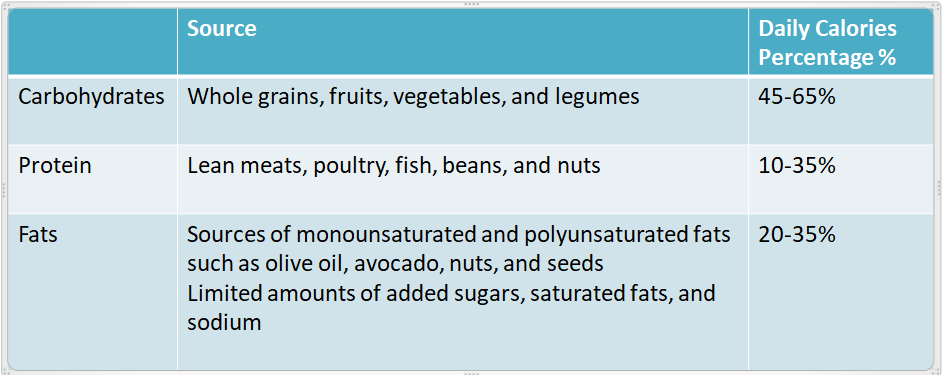A balanced diet is a diet that includes a variety of foods from different food groups in appropriate proportions to meet a person’s nutritional needs. A balanced diet typically includes:
- Fruits and vegetables: These provide essential vitamins, minerals, and fiber.
- Whole grains: These provide complex carbohydrates, fiber, and some essential vitamins and minerals.
- Lean protein sources: These include lean meats, fish, poultry, eggs, beans, and nuts, which provide essential amino acids and other nutrients.
- Low-fat dairy: These provide calcium, vitamin D, and other essential nutrients.
- Healthy fats: These include sources of monounsaturated and polyunsaturated fats such as olive oil, avocado, nuts, and seeds.
A balanced diet provides all the necessary nutrients in the right proportions to support overall health and prevent chronic diseases such as obesity, heart disease, and type 2 diabetes. It is also important to limit the intake of saturated and trans fats, added sugars, and sodium in order to maintain a healthy diet.
There is no one-size-fits-all percentage breakdown for a balanced diet, as the appropriate proportions of different nutrients can vary depending on a person’s age, gender, weight, and physical activity level, as well as any specific dietary needs or health concerns they may have.
However, in general, a balanced diet may include:

Compare Nutritional Values:
To compare the nutritional value of different foods, you can look at their macronutrient and micronutrient content.
- Macronutrients: These are the nutrients that provide energy and make up the bulk of our diet. They include carbohydrates, proteins, and fats.
- Carbohydrates: Provide energy and are found in foods like bread, rice, pasta, fruits, and vegetables.
- Proteins: Essential for building and repairing tissues, and found in foods like meat, fish, beans, and tofu.
- Fats: Provide energy and help with absorption of certain vitamins. They are found in foods like nuts, seeds, oils, and fatty fish.
- Micronutrients: These are the nutrients that are needed in smaller amounts but are essential for good health. They include vitamins and minerals.
- Vitamins: Important for many functions in the body, including immunity, bone health, and cell growth. They are found in a variety of foods, including fruits, vegetables, dairy, and meats.
- Minerals: Essential for bone health, fluid balance, and muscle function. They are found in foods like dairy, meats, nuts, and leafy green vegetables.
When comparing the nutritional value of different foods, it’s important to consider the portion size as well. A food that is high in calories or fat may still be nutritious if consumed in moderation. Additionally, it’s important to consider individual dietary needs and preferences when choosing foods.